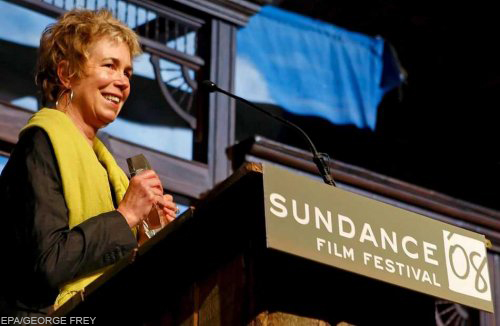
Emmy Award-winning producer and director Lisa F. Jackson had been tracking the horrors unfolding in the Congo for many years, mostly through anecdotal accounts from friends working in the area for the United Nations. She decided to travel to eastern Congo in 2006 to see for herself if what she had been hearing— that Congo was the “rape capital of the world”—was actually true and, if so, how and why this could be happening.
Lisa went with a video camera hoping to find a rape survivor who would talk with her about her experiences. But what she found was not one survivor but hundreds of women who would often wait in lines for hours just to speak with someone who would listen to their stories with compassion and without judgment. She spoke with rape survivors in their eighties and young girls not yet in their teens. She interviewed activists, ministers, peacekeepers, physicians, and even the perpetrators themselves, traveling alone to homes, hospitals, churches, and to remote villages in the jungles of eastern Congo to meet rape survivors who have often been shamed and abandoned.
Lisa realized that no one was covering this story in any meaningful depth and that these women wanted and needed to have their voices heard. So she resolved to make a feature-length film, and she returned to Congo three more times to fill out the story. Jackson was gang-raped in 1976, and she shared her experience with the survivors she interviewed. These women in turn recounted their stories to Lisa with honesty and immediacy.
She traveled and filmed in Congo entirely alone, struggling with language barriers and other challenges. She also encountered incredible resistance from authority figures, and at one point she spent four hours in jail for having an allegedly forged filming permit. Not to mention the terror of interviewing armed rapists in the middle of the bush and the logistical hurdles of traveling through a war zone during a monsoon on some of the world’s worst roads.
Lisa distinctly recalls two Enough Moments that she experienced while in Congo. On her first visit to Panzi Hospital, where many rape survivors are treated, she was stunned and sickened by not only the hundreds of women who were in beds recovering from the surgeries required to repair their mutilated genitals but also by the hundreds more who were waiting for beds to become available. She thought to herself, “Why isn’t the world tearing its hair out at the horror of this?” She decided that the world had to know and to see.
Her second Enough Moment occurred when she interviewed soldiers in the Congolese army who nonchalantly— and without fear of reprisal— confessed to her camera that they had committed dozens of rapes. Here were men admitting to war crimes, and when the interviews were over, they just melted back into the bush, and none would ever be held accountable for what they had told her. It hit her like a ton of bricks: Women in the Congo have no justice. None. Something had to change.
Little did Lisa know how much of an impact her commitment would have. Her resulting film “The Greatest Silence” inspired the U.S. ambassador to the United Nations to vigorously support U.N. Security Council Resolution 1820, which finally recognized rape during conflict as a crime of war and as a destabilizing force for families, societies, and nations. The U.N. passed Resolution 1820 unanimously in May 2008. The film aired on HBO, and it has been screened in the U.S. Senate, the U.K. House of Commons, and in the Congolese National Assembly, and it has also spurred hundreds of grassroots awareness and fundraising efforts by individuals and college campuses around the world.
This profile and many others were compiled for The Enough Moment, a book by John Prendergast and Don Cheadle about engaged citizens – known and unknown, in the U.S. and abroad – who are mobilizing to help end genocide, rape, and the use of child soldiers in Africa. Visit the Enough Moment Wall to hear people describe their “Enough moment” and to upload a video, photo, or written testimonial of your own.
Photo: Lisa F. Jackson at Sundance Film Festival (EPA/George Frey)

